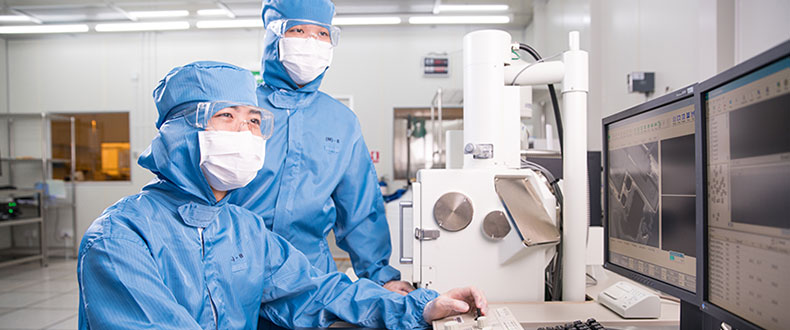
Electronics manufacturing is a major industry underpinning Singapore’s economic growth and is an important contributor to Singapore’s Gross Domestic Product. With many of the world’s semiconductor MNCs such as GlobalFoundries, Micron, SSMC, UMC, VIS having set up and expand their operations in Singapore, the career opportunities in this sector are excellent.
This Work-Study Programme (WSP) provides an avenue for fresh polytechnic graduates to deepen their skills and knowledge for a career in the semiconductor industry. Suitable candidates will be matched with a relevant job offered by a WSP partner company. Possible job roles include:
- Assistant Equipment Engineer
- Assistant Facilities Engineer
- Assistant Integration Engineer
- Assistant Process Engineer
- Assistant Product Engineer
- Assistant Quality Engineer
By the end of this course, you will be able to:
- Demonstrate a strong understanding of the different functional domains within the spectrum of semiconductor manufacturing
- Apply core knowledge of analogue and digital electronics in the design as well as layout of integrated circuits
- Examine process integration schemes and advanced packaging techniques of various silicon-based devices
- Illustrate various integrated circuit reliability and failure mechanisms in modern integrated circuits
- Analyse and improve processes using control and risk management methodologies
- Develop solutions to optimise the yield and reliability of wafer fabrication
Target Audience
Fresh polytechnic graduates who are working in, or keen on joining the semiconductor industry.
What is So Unique About This Programme?
The Work-Study Post-Diploma aims to provide a pathway for career development and further education through two Post-Diploma Certificates (PDCs), equipping you with comprehensive knowledge and skills in the following core areas:
- Integrated Circuit (IC) Design
- Process integration
- Product yield engineering
- Quality assurance
- IC packaging
- Reliability and failure analysis
How Often Do I Need to Attend the Course?
Lessons will be held at Republic Polytechnic.
Course commences in October.
Number of Lessons | Duration |
|---|
| 2 or 3 weekdays (evening) depending on PDC | 6:30pm – 9:30pm |
Note: Some lessons will be conducted online.
Post-Diploma Certificate (PDC) Synopses
1. Post-Diploma Certificate in Semiconductor Design and Fabrication
The PDC consists of the following 2 modules:
Integrated Analog and Digital Circuit Design
This module provides students with a foundational understanding of both digital and analog integrated circuit design principles. In the digital domain, topics include the CMOS inverter, logic gates, and the application of these building blocks in sequential, static, dynamic logic circuits, and digital system design. For analog circuits, the module explores the design of devices in bipolar- and CMOS-based applications, including current mirrors, operational amplifiers, and differential amplifiers.
Semiconductor Fabrication
This module provides students with comprehensive understanding on the Front End Of Line (FEOL) and Back End Of Line (BEOL) process integration flow of diverse silicon-based devices, including Field Effect Transistors (FETs), memories, photonics, and MEMS, alongside advanced packaging techniques employed in modern Integrated Circuits (ICs). Participants will have the opportunity to enhance their comprehension of semiconductor fabrication and nanotechnology applications by exploring the utilisation of nanomaterials and nanofabrication techniques used in modern IC development.
2. Post-Diploma Certificate in Semiconductor Reliability and Risk Management
The PDC consists of the following 3 modules:
Semiconductor Process Risk and Yield Management
In this module, students will learn the concept of process risk and its impact, enabling them to identify problems and apply root cause analysis methods. They will also appreciate the role of process optimisation, and the Design of Experiments (DOE) for systematic improvement and understanding the key process parameters. Additionally, they will recognise the importance of yield modeling and strategies for yield improvement, and basic yield management techniques. They will comprehend the significance of statistical methods in process monitoring and control, providing them with a strong foundation to contribute effectively to semiconductor manufacturing processes, defect prevention, and yield improvement initiatives.
Semiconductor Reliability and Failure
This module offers insights into the broad spectrum of reliability concerns inherent in semiconductor integrated circuits, encompassing failure models and distribution. Students will delve into specific device-level and package-level failure mechanisms, including gate oxide breakdown, hot carrier degradation, time-dependent dielectric breakdown, electromigration, as well as die and wire bonding failure.
Project
This module provides students the opportunity to undertake an individual project to apply what they have learnt and deepen their understanding in topics related to semiconductor manufacturing. Students may choose to work on projects curated by their companies that are aligned closely with the course curriculum.
WSP Eligibility
Singaporeans and Singapore Permanent Residents who are:
- within three years of graduation from the Polytechnics or the Operational Ready Date (ORD) for full-time National Servicemen, or
- within five years of graduation from the Polytechnics, and if their employer is a participating company.
Course Entry Requirement
Applicants should preferably be a graduate of a feeder programme as listed here.
Admission will be reviewed and approved by the polytechnic on a case-by-case basis.
Conditional Offer
Graduating student (in final academic year) from a local polytechnic may apply for the programme.
Click here for more information on how to apply for the programme and receive a Conditional Offer.